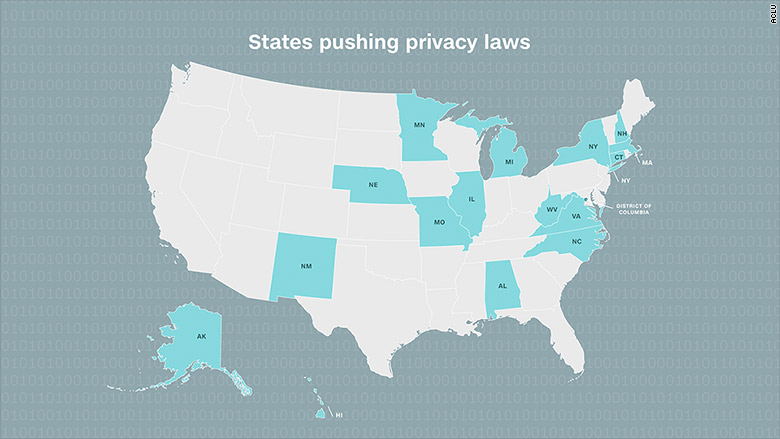
Frustrated with increasing surveillance by the federal government and corporations, politicians in 16 states are pushing for sweeping privacy laws.
On Wednesday, officials proposed legislation to guard personal privacy and student data, and to make it harder for police to use high-tech spying tactics.
The measures, which vary in topic and scope, would protect the personal information of 100 million Americans, a third of the nation. They're being introduced in 16 states across the country, plus the local government in the District of Columbia.
Hawaii is considering a law that prevents a boss from demanding access to an employee's personal email or social media accounts. A measure in Missouri would offer that protection to students and workers.
Nebraska legislation would force police to stop using Stingrays, controversial gadgets that mimic real cell phone towers and trick nearby phones to announce their locations.
New Hampshire proposed an "expectation of privacy" law that would limit how government agencies and corporations can access credit histories, DNA profiles and other personal information.
In all, 16 different bills strengthen student privacy. Three tackle concerns over Stingrays. Two bills limit automatic license plate readers.
Why the push for privacy?
We live in the Age of Data. Our movements, habits, purchases -- nearly everything is tracked. But there are few limits on how that information can be used.
Companies amass sensitive information to better target the sale of products. But they also use Big Data to determine individual insurance rates, borrowing fees and even airline prices.
The companies behind college entrance exams have been sued for selling sensitive student data.
Federal investigators secretly track our location via phone call signals and license plates, collecting data on millions of Americans. Sometimes agents even hover over us using spy planes.
Yet Congress hasn't passed broad reform restricting the use and access of data.
Instead, advocates have turned to state legislators. The American Civil Liberties Union is leading this massive effort, dubbed #TakeCTRL, with the broad support of local conservative and liberal politicians.
"There's growing recognition that our laws are inadequate in dealing with privacy rights of Americans," ACLU national executive director Anthony D. Romero said on Wednesday. "The federal government has been missing in action on these debates."
Michael Boldin is the executive director of the Tenth Amendment Center, which pushes for states to initiate national reforms. He said privacy is the only issue that's energizing "everyone from Tea Party patriots to Occupy activists."
"It's essential for states to draw a line in the sand and say your information will only be collected with your permission or a warrant," Boldin said.
Nine in 10 Americans believe they have no control over their personal information, how it's collected, or how it's used by companies, according to the Pew Research Center.
Michigan State Rep. Peter Lucido, a Republican, said this push for privacy attempts to let Americans retake control.
He criticized data brokers, who collect and sell data in bulk, for "abusing us as Americans" and making us "vulnerable to consumer profiling, identity theft." In the past, data brokers have been caught selling lists of rape victims and AIDS patients.
"We're exploding with information and data across our nation," Lucido said. "Who is the data being shared with? How long is the data being kept? After I'm dead and gone, what are they going to do with that data?"

